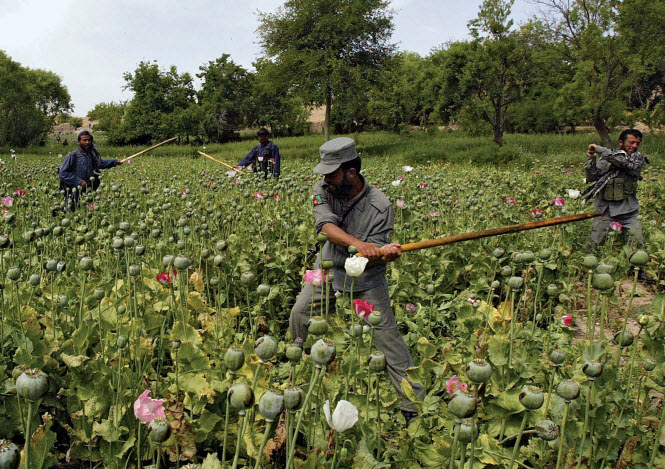 from the ACLU Blog
from the ACLU BlogJune 2011 marks the 40th anniversary of President Richard Nixon’s declaration of a “war on drugs” – a war that has cost roughly a trillion dollars, has produced little to no effect on the supply of or demand for drugs in the United States, and has contributed to making America the world’s largest incarcerator. Throughout the month, check back daily for posts about the drug war, its victims and what needs to be done to restore fairness and create effective policy.
Throughout his successful career at Wal-Mart, Joseph, a husband and father of two, has had to cope with intense pain in his head and neck 24 hours a day. The pain relief medicine prescribed by Joseph’s oncologist helped a little, but Joseph continued to experience constant pain as well as nausea, a side effect of the medication.
In 2008, the people of Michigan, by voter initiative, enacted the Michigan Medical Marihuana Act (MMMA), which allows the use of marijuana to treat certain severe medical conditions such as Joseph’s. After the MMMA was enacted, Joseph’s oncologist recommended that he try marijuana in accordance with the new state law, and Joseph obtained the appropriate registry card from the state. Joseph immediately found medical marijuana very helpful to treat his condition: it dramatically reduced his pain without the previous painkiller’s side of effect of nausea, so he even gained back some of the weight he had lost during his treatment.
Joseph complied with all the MMMA’s requirements and provisions. In accordance with state law, he never used marijuana in the workplace, and never performed duties of any kind for Wal-Mart while under the influence. Joseph made do with his other prescription painkillers throughout the workday and only used the marijuana when he got home from work.
In November 2009, Joseph twisted his knee at work. Wal-Mart policy requires drug testing of all employees injured at work, so Joseph was given a urinary drug test. Not surprisingly, he tested positive for marijuana. Joseph showed his supervisors his state medical marijuana card, which permits him to use the substance to treat the pain his cancer causes, but Wal-Mart didn’t care. Ignoring the Michigan law provision prohibiting “disciplinary action by a business” against a qualifying medical marijuana patient, the Wal-Mart store manager fired Joseph. He has been out of work ever since.
Some people question why marijuana patients should get special employment protection when that drug remains illegal under federal law. But it is precisely because marijuana remains illegal under federal law – and carries a resulting stigma – that the people of Michigan saw the need to provide special employment protections to the people who use medical marijuana legally under state law. As the people of Michigan recognized, federal law, which continues to push the agenda of the failed War on Drugs, has simply failed to keep pace with the experiences of patients like Joseph for whom medical marijuana is uniquely beneficial.
The ACLU is now representing Joseph in his wrongful discharge lawsuit against Wal-Mart, and fighting for the medical marijuana rights of patients nationwide. Wal-Mart should not be allowed to punish Joseph for merely treating his pain and using marijuana as allowed by state law. No patient should ever be forced to choose between his job and his medicine.

[quote]Joseph complied with all the MMMA’s requirements and provisions. In accordance with state law, he never used marijuana in the workplace, and never performed duties of any kind for Wal-Mart while under the influence. Joseph made do with his other prescription painkillers throughout the workday and only used the marijuana when he got home from work.[/quote]
Hmmmmmmmmmmmmmmmmm…. Joseph could manage doing his job during the day with prescribed painkillers, but somehow couldn’t manage his pain at night except by using marijuana when he was off the job not doing anything but sleeping… bit of a credibility problem in this story…
ERM
“bit of a credibility problem in this story”
Not at all from a medical perspective.
1) Many people with chronic pain have an exacerbation of symptoms in the evening or at night presumably fatigue related.
2) Others will find that they can tolerate their pain while awake but not be able to fall asleep because of it even with standard painkillers.
How about trying a prescribed sleeping pill?
I think the issue here is that many people with cancer and wasting diseases do better with cannabis than they do with other drugs.
The reality is that marijuana is illegal for social, moral, and financial reasons, not because it is more medically dangerous. Narcotic pain medications are much more addictive (oxycontin for example) than is marijuana. Likewise, many sleeping pills have a higher addictive potential than does marijuana. Just because a drug is legal does not mean it is safe even when used as prescribed.
Alcohol, again completely legal is a more physiologically dangerous substance than is marijuana.